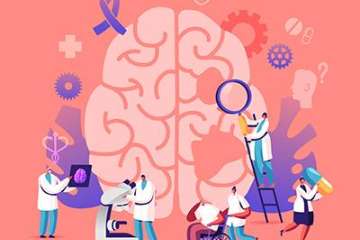More than 5 million people in the United States have Alzheimer’s disease. That number is expected to rise to almost 14 million by 2050. The rise could be attributed to improvements in diagnosis and also people living longer. The disease predominantly affects people age 65 and older; however around 200,000 Americans develop early-onset Alzheimer’s disease before age 65.
While there is no cure for Alzheimer’s disease, doctors can provide treatments for symptoms that impact quality of life.

What is Alzheimer’s disease?
Alzheimer’s disease is a specific condition that causes dementia. People with the disease develop a buildup of protein (plaques) between brain cells. They also develop tangles of twisted protein fibers in those cells. Researchers suspect the plaques and tangles interrupt nerve cell function, which leads to dementia symptoms.
What is dementia?
Dementia occurs when everyday life is impacted by impairments such as:
- Pronounced memory loss
- Problem-solving difficulties
- Language challenges
As dementia progresses, you or your loved one may experience:
- Behavior changes including depression, fear or anxiety
- Disorientation
- Confusion
- Swallowing difficulties
- Walking challenges
Alzheimer’s disease accounts for 60–80% of dementia diagnoses. People with the disease have symptoms that worsen over time. Advancing dementia symptoms may include:
- Having poorer judgement, such as with money matters or grooming
- Having difficulty tracking and paying monthly bills
- Forgetting days or years
- Trouble with conversing and withdrawing from social activities
- Misplacing items and not finding them
What’s the difference between normal forgetfulness and dementia?
Memory loss and cognitive delays can be a normal part of aging. Typical aging can lead to mild cognitive impairment (MCI). MCI is not dementia — it is the stage between the everyday forgetfulness that comes with aging and a more severe decline that your doctor might diagnose as dementia. Typical forgetfulness or memory lapses may cause you to:
- Briefly forget what day it is
- Be at a loss for what word to use
- Lose things on occasion
- Miss paying a bill on time
When to see your doctor about Alzheimer’s disease dementia
It’s vital to seek medical care when you first suspect memory or cognitive declines to determine if your symptoms are a sign of Alheimer’s disease. Because the progression is gradual, there are treatments to help minimize the symptoms associated with Alzheimer’s disease. Your treatment plan and goals will likely shift as the disease progresses.
While there are approved medications for use in each stage of Alzheimer’s disease, you may also be eligible for a clinical trial. These research studies investigate potential treatments before the U.S. Food and Drug Administration approves them for widespread use.
If you are concerned about memory loss or cognitive declines, contact your primary care provider.



